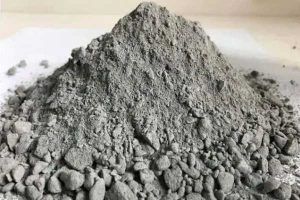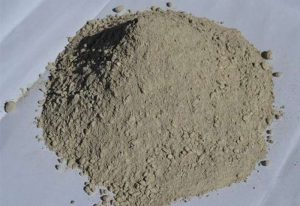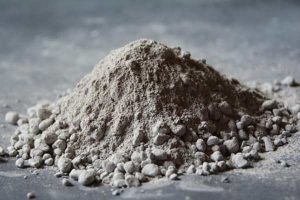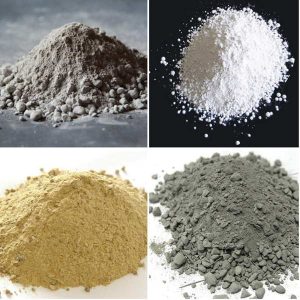Not after firing is one of the characteristics of non-shape refractory materials, in the molding construction that can be used after baking. Compared with obstinaj brikoj: 1. Construction efficiency is very high and can be mechanized use. 2. For the configuration of the complex lining construction and repair and other benefits for the application. 3. Production process is streamlined, and you can save a lot of resources. 4. The cost is relatively low. Indefinite refractory material is made through the process of casting, spraying, and pounding. The liner made without contact seam is fine, also make the liner can not collapse, also known as the whole refractory.
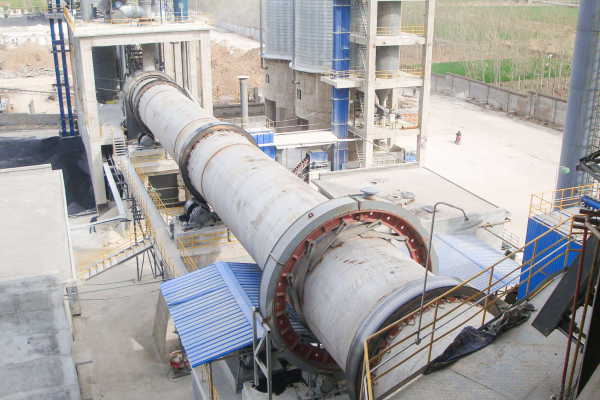
At this stage, the cement rotary kiln most commonly used indefinite refractory materials are mainly the following six kinds:
1. Magnesium Refractory Castables
Magnesium castables are rich in raw materials, with good resistance to alkaline erosion performance, the advantage of molten steel is not polluted, in the iron and steel industry is very potential for development.
Magnesium oxide is the main component of alkaline castables, according to the composition of raw materials can be divided into magnesium-carbon castables, spinel castables, magnesium-silicon castables, aluminum-magnesium castables, and so on. It is composed of sintered magnesium sand aggregate or electrofused magnesium sand and fine powder, low post-sintering line change rate, high load softening temperature and high purity, ktp., which are the advantages of high magnesium cement bonded magnesium castables.
Between 400 ℃ ~ 1200 ℃, with the heat treatment temperature rises, because of magnesium sand hydration generated by the dehydration of magnesium hydroxide and the loss of the role of cementation, powder and refractory aggregates combined is very loose, resulting in a reduction in the strength of refractory castable, easy to lose destruction of the case of falling.
2. Water Glass Combined With Magnesium Refractory Castables
Its advantages and characteristics are good alkaline resistance, strong resistance to erosion of sodium salt melt, and high strength. Tamen, because of the use of water glass as a binding agent, the introduction of a very large number of sodium oxide or potassium oxide and silica, resulting in its refractory and load softening temperature in a large degree of decline, so that its maximum operating temperature is limited to a certain value.
3. Magnesium Castables With Polyphosphates As Binding Agents
Its advantages and characteristics are high loading softening temperature, bona termika ŝoko rezisto, and high strength after firing. Tamen, its strength decreases under the high temperature above 1400℃ because of excessive volatilization of phosphorus pentoxide.
Ĝenerale parolante, magnesium castables with sodium tripolyphosphate, and sodium hexametaphosphate as a binding agent more. On this basis, to strengthen the high-temperature strength of magnesium refractory castables, a certain amount of calcium-containing materials are added to form the Na2O-2CaO-2O5 phase. Tamen, the hydration problem is difficult to get a good solution, and it is easy to cause cracks in the drying process.
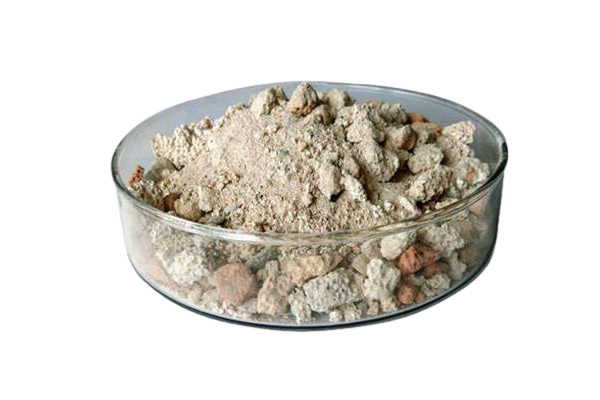
4. Aluminum-Magnesium Refractory Castables
This kind of castable is composed of electrofused or sintered magnesium-aluminum spinel, electrofused corundum, alumina powder, electrofused magnesium sand, sintered magnesium sand, high alumina powder, and so on, and there are water glass, phosphate and so on in terms of bonding agent.
Aluminum and magnesium refractory castables have good thermal shock resistance because of the contained aluminum and magnesium spinel or magnesium and aluminum spinel produced in the heating process of microcracking and expansion, slowing down the material’s thermal stress, so very much aluminum and magnesium spinel exist in the castables on the slag to inhibit penetration of the role of the slag.
The Magnesia olivine proportion of the composition of the castables and the magnesia sand and silica powder proportion of the composition of the castables constitute the magnesia-silica refractory castables.
The castables composed of MgO and SiO2 ultrafine powder are characterized by good construction performance and low water consumption. When 12% silica powder is added to the castables, castables with very low residual shrinkage can be prepared. As the amount of silica is gradually increased, the erosion of the castables by the slag increases, but the depth of penetration by the slag is gradually reduced.
5. Magnesium-Chromium Refractory Castables
Magnesium-chromium castable raw materials can be used after the magnesium-chromium brick crushed aggregate and its fine powder or electrofused magnesium-chromium sand configured from the magnesium sand and Cr2O3 can also be used to configure the magnesium sand and Cr2O3.
Commonly used binding agents are aluminate cement, magnesium sulfate, resin, asphalt, oxide fine powder, ktp., of which the binding effect of polyphosphate is more significant. It is because at high-temperature CaO and Na3PO4 react to generate stable Na2O-2CaO-2O5, which has stronger binding strength and better use.
When the CaO/P2O5 ratio is between 1.6 kaj 1.9, the thermal bonding strength of Na2O-2CaO-2O5 is better. Tamen, Na2O-2CaO-2O5 reacts with silica at high temperatures, so magnesium-chromium castables are controlled within a certain range for silica. Magnesium-chromium castables have better high-temperature performance, stable thermal expansion, good slag resistance, and so on.
6. Magnesium-Carbon Refractory Castables
It is composed of sintered or electrofused magnesium sand, bitumen, graphite, and liquid phenolic resin. To increase its oxidation resistance and strength usually add a certain amount of metal powder. Also it add organic acid as a curing agent to control the time.
The refractory materials produced by PER reduce the bulk density of the material, which reduces the weight of the equipment and minimizes heat loss. By lowering the bulk density of the material while ensuring wear and thermal shock resistance, the load on the equipment is reduced accordingly. The reduction in volume also reduces the thermal conductivity, which reduces heat loss and therefore energy consumption.

